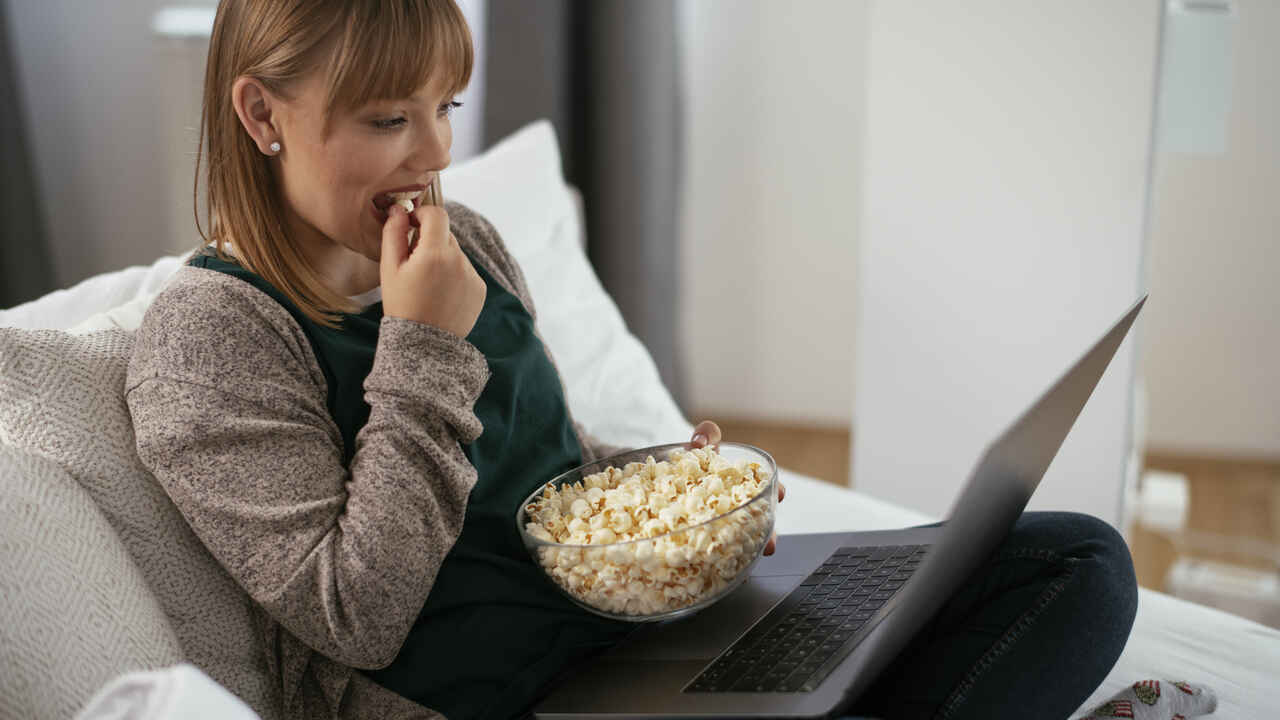 These 5 tips help you recognize and curb mindless eating.
These 5 tips help you recognize and curb mindless eating.
Do you find yourself eating healthy most of the day until the snacking floodgates open at night and destroy your good intentions? If so, you’re certainly not alone. Endless snacking at night can result from a number of factors, including not eating enough during the day or eating due to boredom, stress, anger or sadness. For some, there may also be a hormonal imbalance that causes severe increases in appetite.
Eating a lot of food in a short amount of time, regardless of how hungry you are, can have negative effects on your physical and mental health. Over time, binge eating can make it more likely you’ll gain weight, which puts you at an increased risk of developing heart disease, diabetes and other chronic health conditions.
Whatever the root cause of your evening binge eating is, here are 5 tips to keep things under control so you eat healthier all day – and all night:
Prioritize healthy habits
You may be overeating at night because your body is compensating for something it needs. Perhaps you aren’t eating enough during the day, which leads to insatiable hunger in the evening. Or maybe you aren’t getting adequate sleep, which leaves your body feeling tired and craving carbohydrate-rich foods. Or you may be trying to quell the stress of the day by eating your feelings at night. Prioritizing healthy habits throughout the day helps you combat evening munchies.
Find ways to manage your emotions
If you find that you often grab cookies, chips or “fill in the blank” when you feel stressed, sad, angry or bored, it’s a good idea to find other ways to manage those emotions that don’t have to do with food. Some people find talking to a friend, going for a run or screaming into a pillow helps them deal with how they feel rather than eating their emotions. You may also want to consider seeking professional help from a mental health or weight loss expert to help you manage triggering feelings instead of turning to food for comfort.
Pre-portion snack food
It’s okay to have a snack at night – or at other times of the day. But sometimes you don’t realize how much you’re eating when you’re distracted. Overeating can occur when you crack open a bag of your favorite snack food and mindlessly chomp away. Instead of depending on your willpower or your power of observation to not eat too much, pre-portion snacks so you don’t overdo it. Buy single serving bags at the store. Or buy bigger bags and portion out servings when you get home so they’re ready to grab. Or if you haven’t thought that much ahead, put a single serving into a bowl or on a plate and then put the rest of the bag away before you start eating. There are plenty of snack foods already portioned out for you – like frozen fruit pops, string cheese or whole fruits like apples and pears.
Eat enough protein
Poultry, meat, fish, eggs, tofu, beans, nuts and cheese are all good sources of protein – and enjoying them at mealtime may help reduce the likelihood of overeating later in the day. Data suggests that eating high-protein meals during the day may cut the desire to eat at night in half.
Drink a glass of water
Very often people turn to food when they are actually just thirsty, not hungry. When you feel the urge to eat, drink some water or another low-sugar beverage first to make sure you aren’t mistaking thirst with hunger. Not only may taking a few sips satisfy your thirst and take away the urge to eat, but even if it doesn’t, it makes you more aware of your actions so you don’t just mindlessly turn to food.
Copyright 2020-2021 © Baldwin Publishing, Inc. All rights reserved.
Health eCooking® is a registered trademark of Baldwin Publishing, Inc. Cook eKitchen™ is a designated trademark of Baldwin Publishing, Inc. Any duplication or distribution of the information contained herein without the express approval of Baldwin Publishing, Inc. is strictly prohibited.
Date Last Reviewed: November 16, 2020
Editorial Review: Andrea Cohen, Editorial Director, Baldwin Publishing, Inc. Contact Editor
Medical Review: Nora Minno, RD, CDN
Learn more about Baldwin Publishing Inc. editorial policy, privacy policy, ADA compliance and sponsorship policy.
No information provided by Baldwin Publishing, Inc. in any article is a substitute for medical advice or treatment for any medical condition. Baldwin Publishing, Inc. strongly suggests that you use this information in consultation with your doctor or other health professional. Use or viewing of any Baldwin Publishing, Inc. article signifies your understanding and agreement to the disclaimer and acceptance of these terms of use.